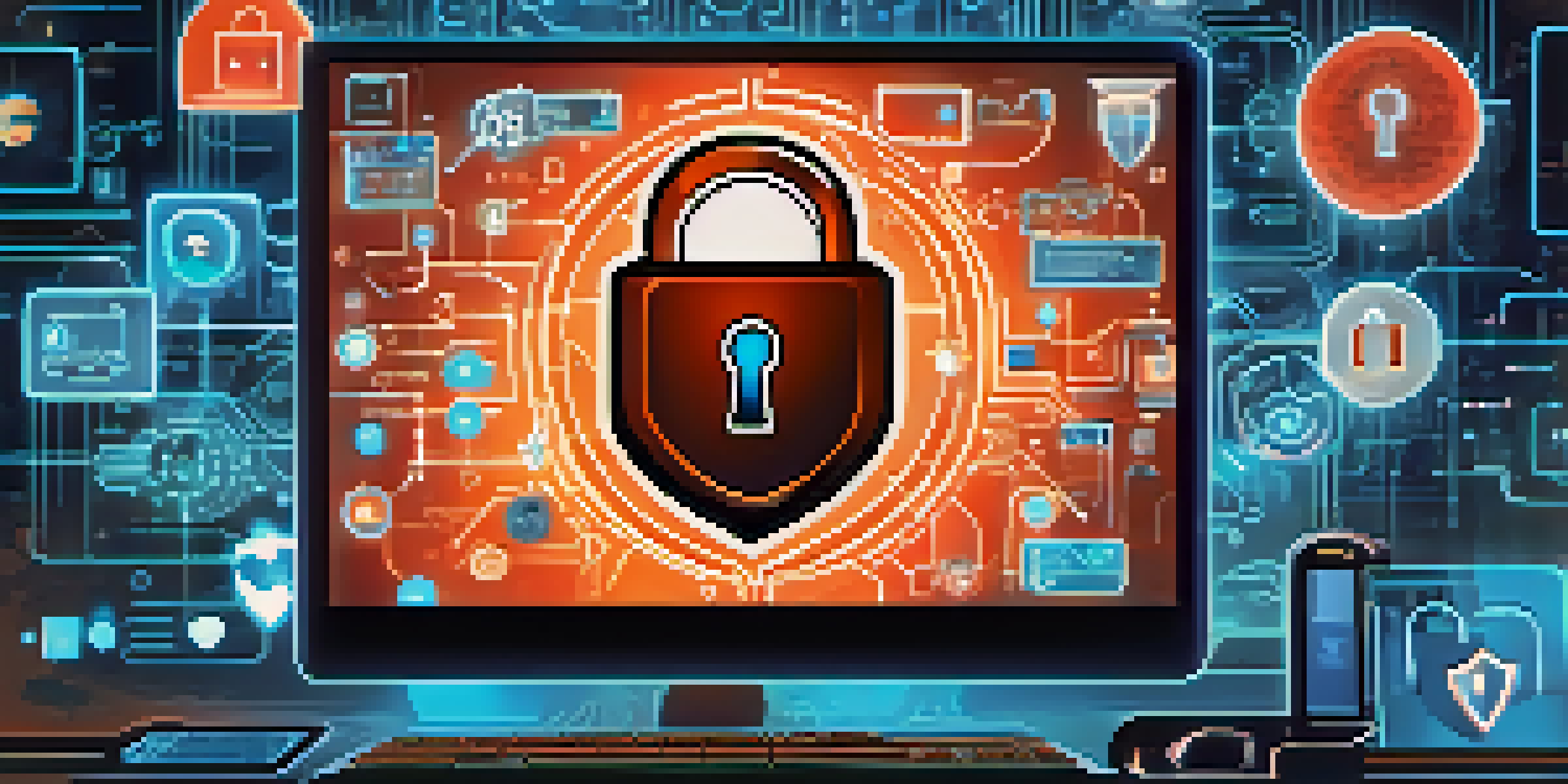Why Cyber Hygiene is Essential for Personal Safety

Understanding Cyber Hygiene and Its Importance
Cyber hygiene refers to the practices and steps that users take to maintain system health and improve online safety. Think of it as the digital equivalent of regular health check-ups; just as you might visit a doctor to prevent illness, you need to manage your online presence to avoid cyber threats. In an age where personal data can be exposed in the blink of an eye, understanding cyber hygiene is crucial for safeguarding your information.
Cybersecurity is much more than a matter of IT. It’s about people, processes, and technology working together to protect your organization.
The landscape of online threats is continuously evolving, with hackers and malicious software becoming more sophisticated. From phishing emails that look legitimate to fake websites designed to steal your information, awareness is key. By implementing good cyber hygiene practices, you can significantly reduce the likelihood of falling victim to these attacks.
In essence, practicing cyber hygiene is about taking proactive measures. It empowers you to control your digital footprint and ensures that your personal and financial information stays protected. Just like keeping your home secure with locks and alarms, maintaining cyber hygiene is an essential step in protecting your online life.
The Role of Strong Passwords in Cyber Hygiene
One of the simplest yet most effective ways to enhance your cyber hygiene is by using strong passwords. A strong password acts like a sturdy lock on your front door; it’s your first line of defense against unauthorized access. Ideally, a strong password should be a mix of letters, numbers, and symbols, making it difficult for attackers to guess.

Moreover, it’s essential to avoid using the same password across multiple accounts. Imagine having just one key that opens all your doors; if that key gets lost or copied, every door is at risk! Instead, consider using a password manager to keep track of your unique passwords securely, allowing you to create complex ones without the headache of remembering them all.
Practice Good Cyber Hygiene
Maintaining cyber hygiene is essential for protecting your personal and financial information from evolving online threats.
Regularly updating your passwords is also a key practice in cyber hygiene. Just as you wouldn’t leave your front door unlocked indefinitely, it’s vital to refresh your passwords periodically. This simple habit can thwart many cyber threats and add an extra layer of security to your online presence.
Recognizing Phishing Attacks and How to Avoid Them
Phishing attacks are one of the most common cyber threats, often disguised as legitimate requests for information. These scams can come through emails, text messages, or even social media, tricking users into providing sensitive information. Recognizing a phishing attempt is like spotting a fake $100 bill; it takes a keen eye to notice the subtle differences.
The most important thing is to be aware of the threats and take precautions to protect yourself.
To avoid falling victim to phishing, always verify the source of any communication before clicking on links or providing personal information. For instance, if you receive an email from your bank asking you to confirm your account details, don’t click the link. Instead, contact your bank directly using a phone number you trust to confirm the request.
Additionally, be wary of messages that create a sense of urgency, such as threats of account suspension or limited-time offers. Scammers often use these tactics to rush you into making hasty decisions. By taking a moment to pause and think critically, you can protect yourself from these deceptive schemes.
The Importance of Software Updates and Patches
Keeping your software updated is another crucial aspect of cyber hygiene. Software updates often include security patches that fix vulnerabilities, much like how a mechanic tightens bolts on a car to prevent accidents. By neglecting updates, you leave your devices open to exploitation by cybercriminals who seek out outdated software for attacks.
Many devices and applications have automatic update features, which can save you from the hassle of remembering to do it yourself. However, it’s still important to check periodically to ensure your systems are current. Regularly updating your software not only protects your data but also enhances functionality and performance.
Use Strong Passwords Regularly
Creating unique, complex passwords and updating them frequently is a fundamental way to enhance your online security.
Taking the time to install updates can be the difference between a secure online experience and becoming a target for hackers. Just as you wouldn’t drive a car without proper maintenance, don’t underestimate the importance of keeping your software in top shape.
Using Two-Factor Authentication for Extra Security
Two-factor authentication (2FA) adds an additional layer of security to your online accounts. Think of it as a double lock on your door: even if someone has your password, they still need a second form of verification to gain access. This could be a code sent to your phone or an authentication app that generates unique codes.
Implementing 2FA is a straightforward way to enhance your cyber hygiene, especially for sensitive accounts like email and banking. Even if a hacker manages to steal your password, they won’t be able to access your account without the second factor, greatly reducing your risk of a breach.
Many platforms now offer 2FA, and setting it up is usually a simple process. Don’t overlook this powerful tool; it’s like having an extra set of eyes watching over your online activity, making it far more challenging for cybercriminals to invade your digital space.
Educating Yourself About Online Threats
Being informed about the various types of online threats is a key component of cyber hygiene. Understanding what malware, ransomware, and spyware are can help you recognize potential dangers. Think of it as being a savvy traveler who knows to avoid unsafe neighborhoods; knowledge keeps you safe from harm.
Numerous resources are available online to educate yourself about the latest cyber threats and how to prevent them. Attending webinars, reading articles, or following trusted cybersecurity blogs can empower you with the knowledge needed to navigate the digital world safely. The more you know, the better equipped you are to make informed decisions.
Stay Informed About Threats
Educating yourself about online dangers, such as phishing and malware, empowers you to make safer decisions in your digital life.
By staying updated on the latest cyber threats, you can adapt your practices accordingly. Just as weather forecasts help you prepare for storms, knowledge in cybersecurity helps you anticipate and avoid potential risks.
Creating a Personal Cyber Hygiene Routine
Establishing a personal cyber hygiene routine can streamline your efforts to stay safe online. Just like a daily skincare regimen keeps your skin healthy, a routine can help you maintain your online security. Start by scheduling regular times to update passwords, check for software updates, and review your online accounts for suspicious activity.
Consider creating a checklist that outlines your cyber hygiene practices. This could include steps like reviewing privacy settings on social media, checking for unauthorized transactions, and being vigilant about email security. By having a tangible reminder, you’re more likely to stay committed to your routine.

Consistency is key in maintaining good cyber hygiene. Just as you wouldn’t skip brushing your teeth, make it a habit to prioritize your online safety. Over time, these small practices can lead to significant improvements in your overall security.